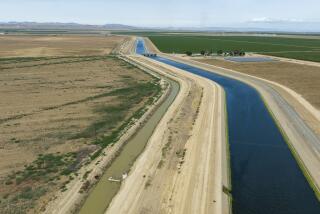Court Deadlocks in Fight Over Colorado River Water Rights
- Share via
WASHINGTON — A legal fight over Colorado River water ended in a 4-4 deadlock at the Supreme Court on Monday, leaving intact a controversial, 11-year-old order from the U.S. Department of the Interior that resulted in increased allocations of water to three Indian reservations along the river.
The states of Arizona and California had been joined by the Metropolitan Water District of Southern California and the Coachella Valley Water District in California in opposing the extra allocations to the reservations.
The water in dispute--104,000 acre-feet per year--is enough to supply 500,000 people in Southern California, according to the water district.
Increased Share of Water
The U.S. 9th Circuit Court of Appeals in 1987 ruled that the Department of the Interior correctly added 3,500 acres to the reservations, an action that had the effect of increasing the reservations’ share of water from the Colorado River.
State and water district officials said the adjustment of the reservations’ boundaries illegally deprived them of their fair share of Colorado River water.
The Supreme Court agreed last year to hear the case. Justice Thurgood Marshall, who was the U.S. solicitor general when the court heard an earlier version of this dispute, recused himself Monday, thus prompting the tie vote.
“This just means more delays. We may end up going back to the Supreme Court anyway,” said Washington lawyer Jerome C. Muys, who represented the water district.
Special Master
The water districts and the states can still directly ask the Supreme Court to appoint a special master to study the issue, hear arguments from both sides and issue a ruling, much as it would in a dispute between two states.
The dispute has not actually deprived Californians of water, officials said. Arizona has not been using its full allotment of water from the river, so the MWD has been able to get all it is seeking. But that may change due to continuing growth in Arizona, according to lawyers, which could make the dispute over the Indians’ water crucial for the future.
The Indians say they need extra water to make their reservations economically viable.
More to Read
Sign up for Essential California
The most important California stories and recommendations in your inbox every morning.
You may occasionally receive promotional content from the Los Angeles Times.











